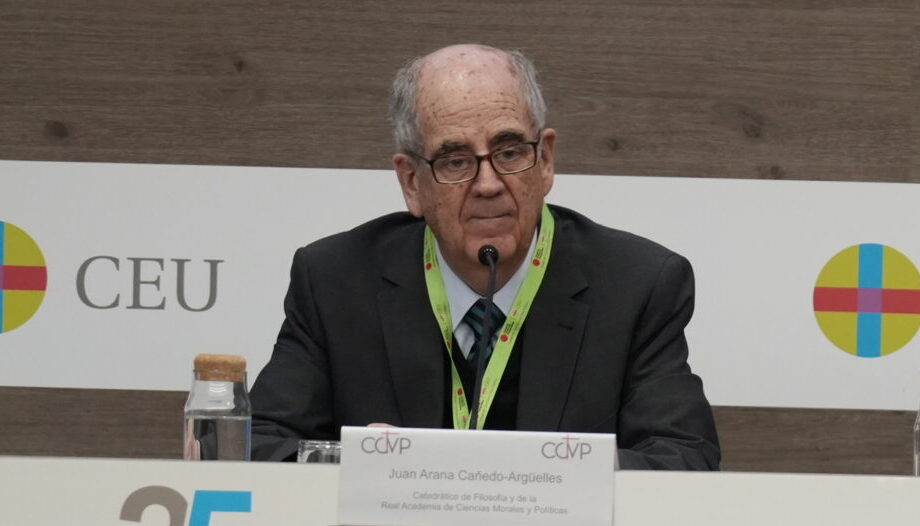As with colors, seasons, or soccer teams, in the congresses Some will like one lecture better, others another; some will like the opening, others the conclusion. In the context of the 25th Catholics and Public Life CongressOn Saturday, Professor of Philosophy and member of the Royal Academy of Moral and Political Sciences, Juan Arana, gave a wide-ranging presentation entitled "The apostolic commitment of the laity in non-clerical times".
It would be too long to go over their arguments, historical and philosophical, but it would be enough to synthesize some of their ideas, which were later collected, as those of other speakers, in the Manifesto of the congress, made public on Sunday.
These are about a dozen expressions of the conference of the philosopher from Seville that can mark part of his exposition.
1) We are witnessing a "progressive demoralization of the species".
2) "Religion is a thing that is not improvised".
3) "The crisis of religious vocations and of faith reinforces the role that the laity will have in the life of the Church, and poses the supreme challenge of assuming in fullness the challenge of the common priesthood".
4) "In an increasingly marginal situation for religion, the laity must be aware of all that the adult exercise of Christian identity represents, in a world that has become demoralized, that has lost its beliefs".
5) "In addition to counting on the fundamental, that is, on God's help, we will have the advantage of the decline and death of clericalism", and the growing presence of "the laity of the post-clericalized era; I say post-clericalized, and not post-Christian".
6) "For a believer, the process of de-Christianization that we are going through is painful, especially when he considers the happiness and joy wasted by so many men and women who have no opportunity to live the liberating message of Christ.
7) "The saddest thing in the history of relations between clergy and laity has been that the latter, the laity, have not always been able to distinguish the true shepherds from the wolves disguised as such".
8) "It is definitely time for the laity".
9) "We are facing a revitalizing challenge, a situation in which a Catholic can also see in the present circumstances an opportunity to renew and boost some dimensions of the faith that had not been sufficiently developed or that had lost part of their pristine strength".
10) "When God speaks, we should listen with reverence, even if we don't fully understand".
11) "When reason fails and faith walks in the dark, it is the propitious moment for hope, for the intimate conviction that if we trust in Christ, we will manage to walk on the waters without sinking".
"Re-evangelize"
Following the development of the program of the XXV congress of the Catholic Association of Propagandists (ACdP) and the CEU, which this Sunday included a Mass celebrated by the Archbishop of Madrid, Cardinal José Cobo, the conclusions were made public in a press release. manifestoas has been customary in recent years.
The final sentences focus on the fact that "we live in a secularized and therefore de-Christianized world. We have the duty to update the evangelical mandate of Christ, assuming the need to re-evangelize our own society and being aware that Western countries today are also mission lands".
It also concludes that "this new evangelization has a fundamental channel in the communitarian living of the faith, necessary to ensure that, personally, we can remain faithful in an adverse context and, socially, we can better contribute to the Catholic proposal, maintaining our Christian heritage as a living tradition to be transmitted to others".
Seven points
In summary, these are the remaining aspects of the manifesto.
- Spain is a nation in which Christianity is a substantial element of its very existence and culture.
- Mary and the saints have been the main apologists for the faith.
- To be a loudspeaker and permanent denunciation of persecuted Christians.
- The work of man is the transcendental pillar of the whole social question, and the dignity of the person lies in the fact of being and in the fact that the community yearns for the common good, leaving the social projection as something intrinsic to man.
- To defend and accompany all human beings in these circumstances, where their integrity and right to life are threatened.
- The family is a privileged place for the transmission of the faith: from parents to children, between spouses, between siblings and also from children to parents.
- The school is an indispensable space for evangelization. Evangelization in education is not only a good for religious institutions, but fundamentally supposes a right for society as a whole, the exercise of its freedoms and the guarantee of democratic plurality.








